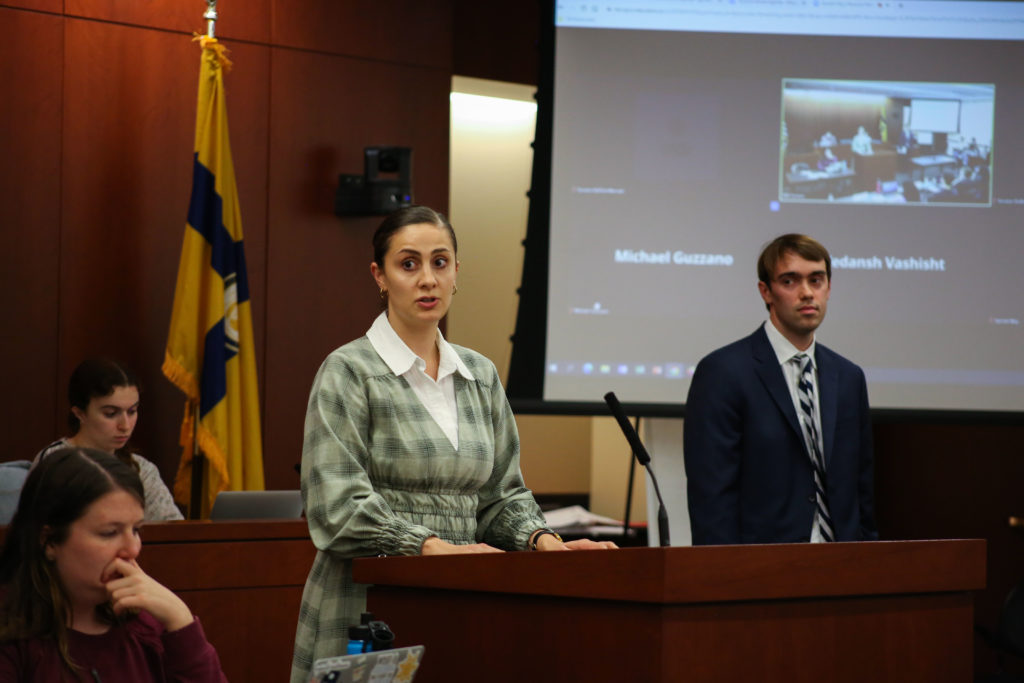The Student Bar Association Senate Tuesday unanimously passed a resolution calling on GW Law to suspend all school activities associated with the Republic of Azerbaijan.
The resolution calls on the law school to reconsider academic curriculums that partner with Azerbaijan and may exclude Armenians based on ethnicity, like the Manfred Lachs Moot Court Competition, which is holding its finals in Baku, Azerbaijan. The resolution also calls on GW Law to devote adequate resources to the exploration of xenophobia and violence toward Armenian populations within the context of international law.
Shushan Gabrielyan, the co-president of the Armenian Law Students Association, said members of the Armenian community felt “disheartened” by the lack of international knowledge and action regarding the recent territorial conflict between Azerbaijan and Armenia.
“Examples of this are omnipresent and exemplified by our school sponsorship and tacit endorsement of academic programs that further normalize and amplify the marginalization of our youth,” she said. “Today, we ask you to stand in solidarity with the Armenian community at George Washington University by condemning Azerbaijan’s unprovoked attack on Armenia and reconsidering academic programs and external competitions that exclude students on the basis of their race.”
The resolution references a program through the Graduate School of Education and Human Development in partnership with the Azerbaijan State Pedagogical University, and it says graduate programs within the graduate division of the Elliott School of International Affairs “sponsor academic programs in the Azerbaijan.”
The senate also unanimously granted the Student Animal Legal Defense Fund $1,549 to finance their attendance to the Animal Law Conference, which will be held Nov. 4-6 in Portland, Oregon, where the student organization will be receiving the national organization’s Chapter of the Year Award for their advocacy last year.
Laura Mezzanotte, the organization’s president, said that the conference was an “important networking opportunity” to secure influential guest speakers for the following year.
“This is a great publicity moment for us,” she said. “It’s a great publicity moment for GW because they’re trying to expand this program.”
SBA Sen. Charles Schmidt said the senate should fund requests “for students to do enriching events” that reap “profound benefits.”
“I’m proud of us for passing the bill to give money to the Student Animal Legal Defense Fund to attend their conference,” he said.
The SBA Senate unanimously confirmed Natalie Smith and Johann Choo as associate judges of the SBA Supreme Court. The court now has five associate judges and a chief judge.
The senate unanimously authorized $99.08 to cover costs associated with the International Refugee Assistance Project’s general body meeting.
The SBA Senate rejected legislation that would have granted $100 to the SBA Supreme Court to purchase judge’s robes. Eight senators voted in favor of the funding, and 12 senators voted in opposition.
SBA Sen. John Tuley, the chair of the finance committee who brought the request to the full senate, said he voted against the request because he thought it did not justify spending students’ money.
“The way I put it in debate was that if a student came to me at the end of the year and asked ‘What did we spend money on?’ and I said ‘We spent it on robes for the judicial branch,’ I don’t know that they would be particularly happy with that decision,” he said.
SBA President Nicole Karem said historically, the SBA Supreme Court has not been viewed as a “co-equal” branch of the SBA. She did not speak in favor or against the bill, deferring to the senate.
“What I will say is don’t let the fact that they haven’t been given money as part of the beginning of the year allocation color your opinion,” she said. “Because I think they’ve been a branch that’s been overlooked in the past.”
SBA Supreme Court Chief Judge Deja Williams said in her three years on the court, it has not weighed in on any cases, but the lack of cases in the first year may have been due to the pandemic.
SBA Sen. Raisa Shah announced on behalf of the student life committee that the SBA has placed menstrual products in bathrooms on the first floor of Lerner Hall in the law school as part of a pilot program. She said the baskets have been placed alongside signs asking people to take only what they need.
Shah said the committee’s “ultimate goal” is to place menstrual products in six bathrooms in law school buildings and every bathroom in the Law Learning Center. She said she is in contact with a graduate student Student Association senator who worked on installing menstrual product dispensers on the main campus.
The next SBA Senate meeting will be held on Nov. 8 at 9:15 p.m at the Law Learning Center.








